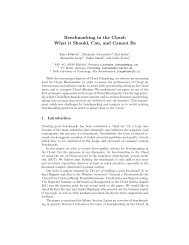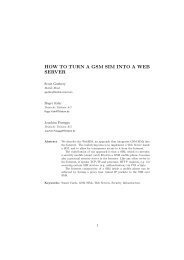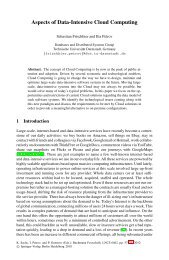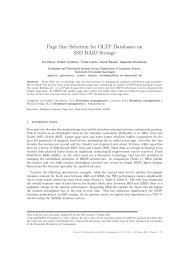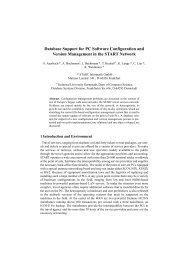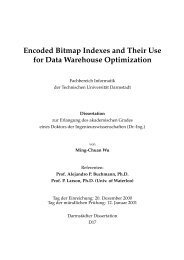- Page 1: Performance Modeling and Benchmarki
- Page 6 and 7: 4.3.4 Tool Extension . . . . . . .
- Page 8 and 9: 5.7 Proportions of the Interactions
- Page 11 and 12: List of Acronyms Acronym λ t,k j A
- Page 13 and 14: Acronym SPEC-OSG SPE SPN SQL ST SUT
- Page 15 and 16: Chapter 1 Introduction 1.1 Motivati
- Page 17 and 18: PC Server 310 PC Server 310 PC Serv
- Page 19 and 20: 1.3. APPROACH AND CONTRIBUTIONS OF
- Page 21 and 22: 1.4. THESIS ORGANIZATION 7 • Stan
- Page 23 and 24: Chapter 2 Background In this chapte
- Page 25 and 26: 2.1. EVENT-BASED SYSTEMS 11 is gene
- Page 27 and 28: 2.2. TECHNOLOGY PLATFORMS OF EVENT-
- Page 29 and 30: 2.2. TECHNOLOGY PLATFORMS OF EVENT-
- Page 31 and 32: 2.2. TECHNOLOGY PLATFORMS OF EVENT-
- Page 33 and 34: 2.2. TECHNOLOGY PLATFORMS OF EVENT-
- Page 35 and 36: 2.3. INTRODUCTION TO QUEUEING PETRI
- Page 37 and 38: 2.3. INTRODUCTION TO QUEUEING PETRI
- Page 39 and 40: Chapter 3 Related Work In this chap
- Page 41 and 42: 3.2. BENCHMARKING OF EVENT-BASED SY
- Page 43 and 44: 3.2. BENCHMARKING OF EVENT-BASED SY
- Page 45 and 46: 3.4. CONCLUDING REMARKS 31 hierarch
- Page 47 and 48: Chapter 4 Performance Engineering o
- Page 49 and 50: 4.1. MODELING METHODOLOGY FOR EBS 3
- Page 51 and 52: 4.1. MODELING METHODOLOGY FOR EBS 3
- Page 53 and 54: 4.1. MODELING METHODOLOGY FOR EBS 3
- Page 55 and 56:
4.1. MODELING METHODOLOGY FOR EBS 4
- Page 57 and 58:
4.2. PERFORMANCE MODELING PATTERN 4
- Page 59 and 60:
4.2. PERFORMANCE MODELING PATTERN 4
- Page 61 and 62:
4.2. PERFORMANCE MODELING PATTERN 4
- Page 63 and 64:
4.2. PERFORMANCE MODELING PATTERN 4
- Page 65 and 66:
4.2. PERFORMANCE MODELING PATTERN 5
- Page 67 and 68:
4.2. PERFORMANCE MODELING PATTERN 5
- Page 69 and 70:
4.2. PERFORMANCE MODELING PATTERN 5
- Page 71 and 72:
4.2. PERFORMANCE MODELING PATTERN 5
- Page 73 and 74:
4.2. PERFORMANCE MODELING PATTERN 5
- Page 75 and 76:
4.2. PERFORMANCE MODELING PATTERN 6
- Page 77 and 78:
4.2. PERFORMANCE MODELING PATTERN 6
- Page 79 and 80:
4.2. PERFORMANCE MODELING PATTERN 6
- Page 81 and 82:
4.2. PERFORMANCE MODELING PATTERN 6
- Page 83 and 84:
4.2. PERFORMANCE MODELING PATTERN 6
- Page 85 and 86:
4.2. PERFORMANCE MODELING PATTERN 7
- Page 87 and 88:
4.3. EXTENSIONS OF QPNS 73 ,-).$%&'
- Page 89 and 90:
4.4. CONCLUDING REMARKS 75 Without
- Page 91 and 92:
Chapter 5 Benchmarking of Event-Bas
- Page 93 and 94:
5.1. SPECJMS2007 - A STANDARD BENCH
- Page 95 and 96:
5.1. SPECJMS2007 - A STANDARD BENCH
- Page 97 and 98:
5.1. SPECJMS2007 - A STANDARD BENCH
- Page 99 and 100:
5.1. SPECJMS2007 - A STANDARD BENCH
- Page 101 and 102:
5.1. SPECJMS2007 - A STANDARD BENCH
- Page 103 and 104:
5.1. SPECJMS2007 - A STANDARD BENCH
- Page 105 and 106:
5.1. SPECJMS2007 - A STANDARD BENCH
- Page 107 and 108:
5.1. SPECJMS2007 - A STANDARD BENCH
- Page 109 and 110:
5.1. SPECJMS2007 - A STANDARD BENCH
- Page 111 and 112:
5.1. SPECJMS2007 - A STANDARD BENCH
- Page 113 and 114:
5.1. SPECJMS2007 - A STANDARD BENCH
- Page 115 and 116:
5.2. CASE STUDY I: SPECJMS2007 101
- Page 117 and 118:
5.2. CASE STUDY I: SPECJMS2007 103
- Page 119 and 120:
5.2. CASE STUDY I: SPECJMS2007 105
- Page 121 and 122:
5.2. CASE STUDY I: SPECJMS2007 107
- Page 123 and 124:
5.2. CASE STUDY I: SPECJMS2007 109
- Page 125 and 126:
5.3. JMS2009-PS - A PUBLISH /SUBSCR
- Page 127 and 128:
5.3. JMS2009-PS - A PUBLISH /SUBSCR
- Page 129 and 130:
5.4. CASE STUDY II: JMS2009-PS 115
- Page 131 and 132:
5.4. CASE STUDY II: JMS2009-PS 117
- Page 133 and 134:
Chapter 6 Performance Modeling of E
- Page 135 and 136:
6.2. MODELING SPECJMS2007 121 Scena
- Page 137 and 138:
6.2. MODELING SPECJMS2007 123 BASE*
- Page 139 and 140:
6.2. MODELING SPECJMS2007 125 1‘O
- Page 141 and 142:
6.2. MODELING SPECJMS2007 127 Sc. 1
- Page 143 and 144:
6.2. MODELING SPECJMS2007 129 Perce
- Page 145 and 146:
6.2. MODELING SPECJMS2007 131 Serve
- Page 147 and 148:
6.3. CONCLUDING REMARKS 133 the mod
- Page 149 and 150:
Chapter 7 Conclusions and Outlook W
- Page 151 and 152:
7.1. ONGOING AND FUTURE WORK 137 JA
- Page 153 and 154:
7.1. ONGOING AND FUTURE WORK 139 th
- Page 155 and 156:
Bibliography [1] J. Abbott, K. B. M
- Page 157 and 158:
BIBLIOGRAPHY 143 [29] BiCEP Researc
- Page 159 and 160:
BIBLIOGRAPHY 145 [61] G. Cugola and
- Page 161 and 162:
BIBLIOGRAPHY 147 [92] R. Henjes, M.
- Page 163 and 164:
BIBLIOGRAPHY 149 [128] S. Kounev an
- Page 165 and 166:
BIBLIOGRAPHY 151 [162] Object Compu
- Page 167 and 168:
BIBLIOGRAPHY 153 [197] K. Sachs, S.
- Page 169 and 170:
BIBLIOGRAPHY 155 [228] P. Tran, P.
- Page 171:
Erklärung Hiermit erkläre ich, di



